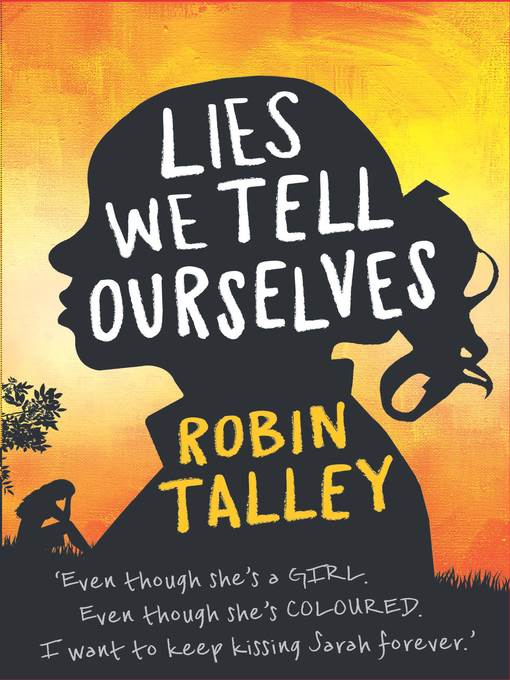
Lies We Tell Ourselves
فرمت کتاب
ebook
تاریخ انتشار
2014
Lexile Score
630
Reading Level
2-3
ATOS
4.2
Interest Level
9-12(UG)
نویسنده
Robin Talleyناشر
Harlequin Teenشابک
9781488721120
کتاب های مرتبط
- اطلاعات
- نقد و بررسی
- دیدگاه کاربران
نقد و بررسی

September 29, 2014
Talley's first novel takes a close, honest look at school integration and sexual identity in a small fictional Virginia town in 1959. The story unfolds through the alternating narratives of two high school seniors: Linda Hairston, the white daughter of a journalist who writes editorials opposing integration, and Sarah Dunbar, one of 10 new black students at their recently integrated high school, where racial tensions are running high. When Linda and Sarah are forced to work together on a class project, they are immediately drawn toward one another and mutually terrified of their attraction. Linda, as a result of her abusive father's influence, views integration as an irritating disruption, while Sarah eloquently debates Linda's negative perceptions. Chapters begin with lies that Sarah and Linda disprove, such as "I'm not brave enough for this" and "None of this has anything to do with me." Talley details the girls' growth as they learn to form their own moral codes, while steeping readers in a pivotal moment of history. Ages 14âup. Agent: Jim McCarthy, Dystel & Goderich Literary Management.

August 1, 2014
A coming-of-age story about desegregation that also tackles sexual identity. High school senior Sarah Dunbar is one of 10 black students who will be the first to integrate an all-white school in Virginia in 1959. Set in a fictional town, the novel mirrors many incidents that occurred in Virginia and other Southern states during desegregation, including Virginia's "Massive Resistance" movement, which closed all-white schools rather than allow integration of African-American students. Sarah's first day of school, which takes up a significant portion of the book, becomes a piercing look at the courage it takes to endure outbursts of "nigger bitch" and other forms of extreme hatred, violence, racism and sexism. Quietly promoting these attacks through editorials (since her father is editor of the local newspaper) is Linda Hairston, who blames "colored people" for all the disruptions in the school year. When the two teens are assigned to work on a class project together, they learn about their respective struggles and surprisingly develop feelings for each other. Alternating first-person narration shows how Sarah questions her "unnatural" sexual orientation in a time without gay and lesbian role models or accessible information and how Linda questions her own options for exiting an abusive home. As the young women gain confidence and independence, they arrive at a hopeful ending with a future that's inclusive in more ways than one. (author's note) (Historical fiction. 13-18)
COPYRIGHT(2014) Kirkus Reviews, ALL RIGHTS RESERVED.

July 1, 2014
Gr 9 Up-As seniors in Jefferson High School's class of 1959, Sarah Dunbar and Linda Hairston have much in common. Both are strong-willed and smart. Both love to sing. Both are desperate to break out of the mold society prescribes for young ladies. Yet despite their similarities, the teens stand on opposite sides of the school integration debate. Sarah is one of eight black students selected to integrate the all-white high school. Linda hates the turmoil these students have caused in her community and truly believes the pro-segregation editorials her father writes for the local newspaper. But when they are forced to work together on a school project, Sarah and Linda slowly learn to respect each other and-eventually-become friends, and then something more. Set in Virginia, this well-paced, engrossing story features strong female characters living in the height of the Civil Rights Movement. Each chapter title is a "lie" that either Sarah or Linda tells herself as a defense mechanism against intense racial tension and strict gender roles. This format, along with alternating viewpoints, work well with the story. It's a beautifully written and compelling read; however, Lies takes on so many topics-racism, sexism, gender roles, homosexuality, child abuse-that the issues overwhelm an otherwise strong plot. There is frequent use of racial slurs and the "n-word," but it is true to the period. For another school integration story of female friendship for younger readers, recommend Kristin Levine's The Lions of Little Rock (Putnam, 2012).-Leigh Collazo, Ed Willkie Middle School, Fort Worth, TX
Copyright 2014 School Library Journal, LLC Used with permission.

























دیدگاه کاربران